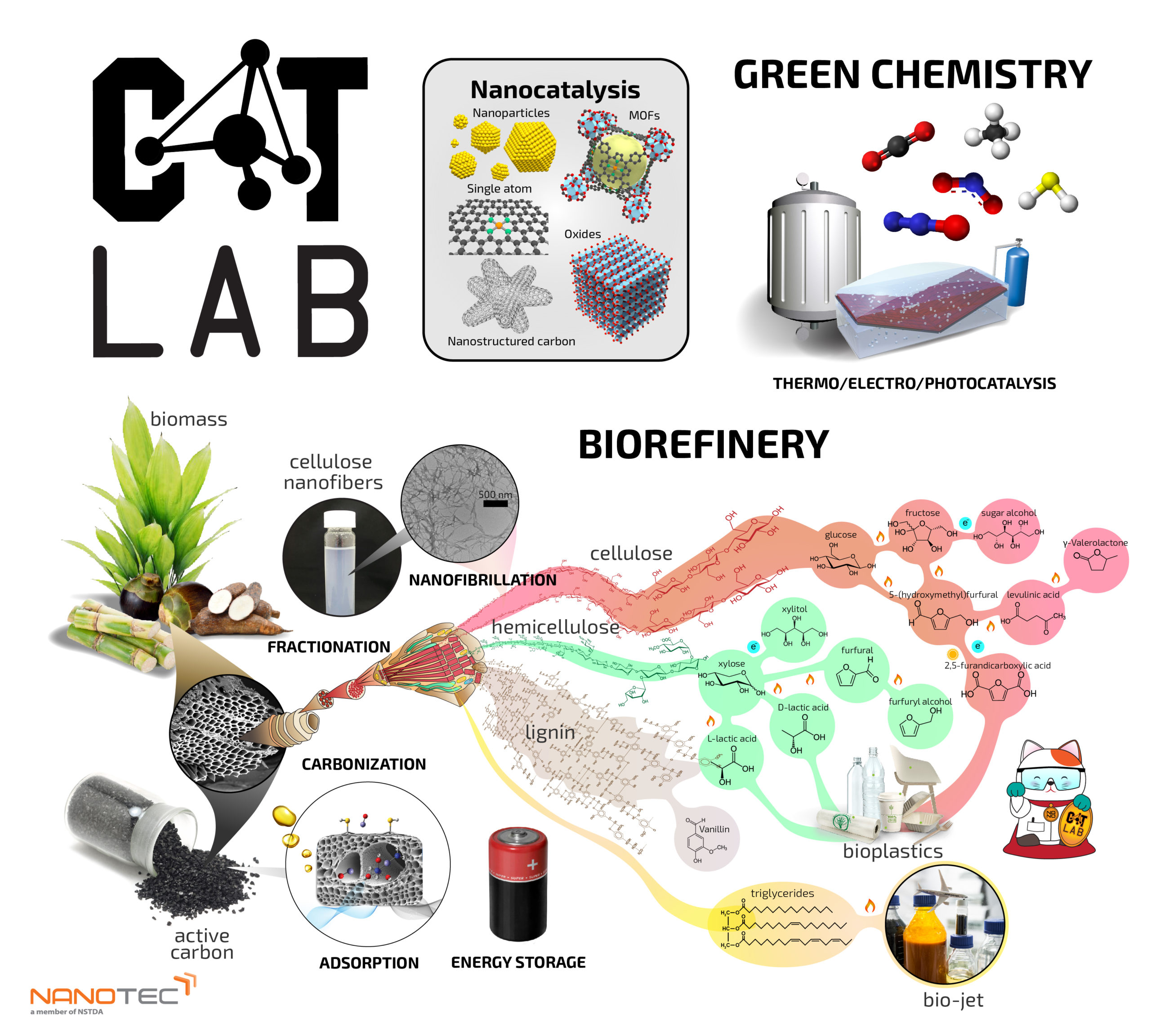CAT research team focuses on 2 main research topics: biorefinery and green chemistry, to ensure the sustainable development of Thailand. We are specialized in the upgrading of various biomass sources such as water hyacinth, bagasse, coconut shell, pineapple leave, rice straw, and coffee bean.
These biomass sources can be carbonized and functionalized to form nanocarbon products i.e. mesoporous carbon, versatile functionalized carbon for BTEX, NOx, COx, H2S, butane, pigments, oil, and heavy metal adsorption, and conductive carbon for electrochemical devices. The biomass can undergo fractionation processes i.e. hydrothermal, solvothermal, and steam explosion which separate the lignocellulose to cellulose, hemicellulose, and lignin. The cellulose pulp can undergo the nanofibrillation process to produce nanocellulose, which can be utilized in petrochemical, packaging, automotive, food & beverage, and healthcare sectors.
The cellulosic sugars and triglycerides obtained from the fractionation process can be catalytically converted to platform biochemicals and biofuels. Our targeted platform chemicals from cellulosic sugar are levulinic acid, γ-valerolactone, enantiomer-specific lactic acid, furfural, furfuryl alcohol, sugar alcohols, 5-hydroxymethylfurfural, and 2,5-furandicarboxylic acid. The targeted products for triglycerides are biodiesel, green diesel, bio-jet, polyols, and short-chain fatty acids.
Beyond biorefinery, CAT team work also actively on the conversion of greenhouse gases such as CO2, methane, and NOx via conventional thermocatalysis i.e. dry reforming of CO2 and methane, selective catalytic reduction reactions, and oxidation, as well as other novel catalytic processes such as artificial photosynthesis (photoelectrochemical CO2 reduction), electrocatalysis of CO2 and N2O, and magnetic-assisted hydrogenation. Additionally, we work extensively on developing membrane separation systems of both gas and liquid products. Lastly, we actively engage the development of nanomaterials and systems for energy devices; batteries (Li-ion, Ca-ion, and Na-ion), solar harvesting materials, electrolyzers, and H2 storage.

Current research projects
-
-
-
-
-
- Thermochemical conversion of biomass to lactic acid, 5-hydroxymethylfurfural, and gamma-valerolactone
- Electrochemical conversion of biomass to 2,5-furandicarboxylic acid
- Pre-pilot scale production of high-surface area activated carbon from biomass
- Electrochemical and photochemical reduction of CO2 to fuels
- Production of nanocellulose from biomass
- Metal-organic frameworks for heterogeneous catalysis
- Development of nanomaterials from biomass for electrode materials in lithium-ion batteries
- Design and development of nanomaterials for purification of biorefinery products
- Electrochemical N2O reduction for medical gas waste treatment
- Electrochemical H2O2 production from carbon catalysts
- Fractionation of biomass using liquid hot water and steam explosion
- Nanomaterials for Biolipid Conversion via Photo/Thermal Catalysis
-
-
-
-